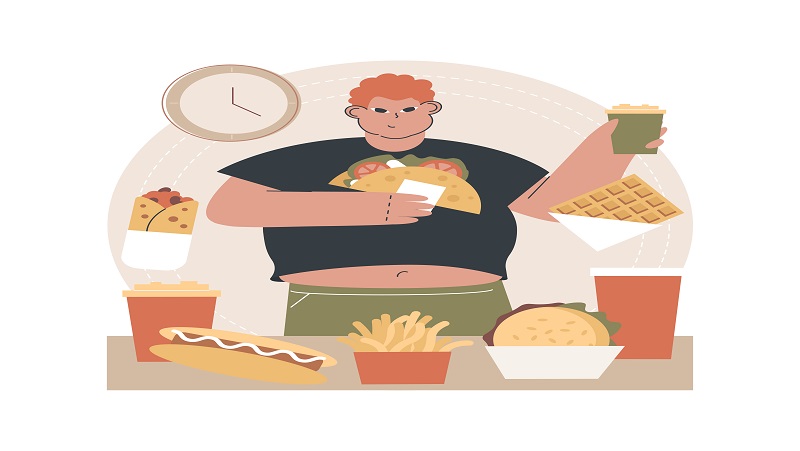When on a weight loss spree, we often tend to do everything right. From counting calories to making healthy food choices and exercising regularly, we make countless changes in our daily routine just to lose those extra pounds. But still, sometimes even after our consistent efforts, the scale doesn’t budge. It’s both frustrating and disheartening to find yourself stuck in a weight loss plateau and we often wonder what could be leading to this roadblock.
Well, there could be several reasons that could be sabotaging your weight loss efforts. These include:
1. Underestimating Your Caloric Intake
One of the fundamental principles of weight loss is maintaining a calorie deficit. However, underestimating the number of calories consumed, especially from hidden sources, can impede your progress. Therefore, for consistent weight loss, it is important to maintain a meticulous food journal and track your intake accurately.
2. Lack of Portion Control
Did you know that even healthy foods can contribute to weight gain if portion sizes are not monitored consistently? However, you don’t have to limit yourself too much either. Not eating enough can lead to nutritional deficiency and can impact your health negatively.
The best way is to practice portion control and eating within a specific window. It helps to avoid unintentional overeating and keeps your appetite in control. Consider speaking with a certified weight loss physician like Dr. Mona Lala for personalized guidance on portion sizes and a tailored approach to your weight loss journey.
3. Poor Eating Patterns
Irregular eating patterns, such as skipping meals or having erratic meal timings, can disrupt your metabolism. Aim for eating regular and balanced meals throughout the day to keep your metabolism steady. A certified nutritionist can help you chalk a meal plan that works best for you.
4. Not Drinking Enough Water
Staying adequately hydrated is crucial for overall health and can positively impact weight loss. Sometimes, our body confuses thirst with hunger, which may lead to unnecessary snacking. So, to avoid unnecessary calorie intake, stay well hydrated. Drink at least 8 glasses of water throughout the day.
5. Inconsistent Exercise Routine
Exercise is as important for weight loss as diet. An inconsistent or monotonous exercise routine may make you hit a plateau and hinder progress. For consistent weight loss, it is important to mix up your workouts. Combine cardiovascular exercises with strength and weight resistance training for optimal results. Consult a certified weight loss physician or a registered dietician to know the diet and exercise regime that will work best for you.
6. Lack of Sleep
Quality sleep is often underestimated in its role in weight management. Poor sleep patterns can disrupt hormonal balance and increase cravings for high-calorie foods. Strive for 7-9 hours of quality sleep each night. Practice meditation for sound sleep.
7. Stress
Chronic stress can lead to emotional eating. You may crave or consume high-calorie, comfort foods to relieve stress. Unfortunately, these food choices may not align with your weight loss goals.
Managing stress is a key component of a holistic approach to weight loss. Incorporating stress-reducing activities such as meditation, yoga, deep breathing exercises, or engaging in hobbies can help break the cycle of emotional eating. Additionally, seeking support from friends, family, or a mental health professional to cope with stress in a healthier way.
8. Overreliance on Processed Foods
Processed foods are laden with sugars and unhealthy fats and can be a major obstacle to weight loss. Instead of processed food, opt for whole, nutrient-dense foods that nourish your body and keep you fuller for longer.
9. Sedentary Lifestyle
Do you follow an active lifestyle routine? Or are glued to your seat for most part of the day? Well, regular physical activity is crucial for effective weight management. So, if your routine involves prolonged periods of sitting, incorporate movement breaks and structured exercise to boost your metabolism. Get up every half an hour and stretch, take a short walk, or perform simple exercises to keep your body active. This not only helps in burning calories but also prevents stiffness and promotes overall well-being.
10. Underlying Medical Conditions
Certain medical conditions, such as hypothyroidism, insulin resistance, or hormonal imbalances, can make weight loss challenging. If you are not losing weight, it is important to consult with a healthcare professional to rule out any underlying health issues.
You may also face weight loss challenges if you on medicines that lead to weight gain. This may include medications prescribed for conditions like depression, hormonal imbalances, or certain chronic illnesses. While these medications are essential for managing health issues, they can have the side effect of weight gain. It’s crucial to have open communication with your healthcare provider about any concerns regarding weight gain related to medications. Together, you can explore potential alternative weight loss programs or strategies to mitigate their impact on your weight.
11. Unrealistic Expectations
Setting unrealistic expectations for weight loss can become a significant hurdle on your journey to a healthier lifestyle. It’s essential to understand that weight loss is a gradual process, and expecting rapid results can lead to frustration and disappointment. Unrealistic goals may result in unhealthy practices like crash diets or excessive exercise.
To overcome this challenge, focus on setting achievable and sustainable goals. Aim for gradual, steady progress and focus on overall well-being rather than quick fixes. Celebrate small victories along the way and be patient with yourself. Consider consulting with a registered dietitian or fitness professional to create a realistic and personalized plan that aligns with your health goals.
Remember, the path to a healthier weight is a marathon, not a sprint, and the key lies in fostering habits that contribute to your overall well-being. So, incorporate a holistic approach to well-being that addresses both physical and mental aspects of your health. Seek support from certified healthcare professionals, like Dr. Lala, to guide you on this journey, overcome challenges, and achieve lasting weight loss success. It’s the easiest way to achieve a healthy weight loss.




